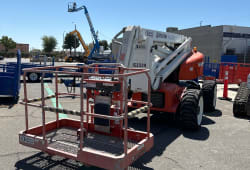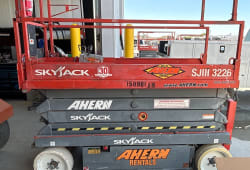Equipment Sales: A Comprehensive Guide
7 Lectura mínima
)
marzo 15, 2024
Introduction to Equipment Sales
In today's dynamic marketplace, the demand for various types of equipment remains ever-present. From construction to agriculture and manufacturing, businesses rely heavily on equipment to streamline operations and enhance productivity. This article explores the nuances of equipment sales, shedding light on its significance, types, purchasing considerations, and more.
Importance of Equipment Sales
Efficient equipment is the backbone of many industries, facilitating tasks that would otherwise be labor-intensive or time-consuming. Whether it's heavy machinery on a construction site or specialized tools in a manufacturing facility, the right equipment can make all the difference in achieving optimal output and maintaining a competitive edge.
Types of Equipment Sold
Construction Equipment
Construction companies require a diverse range of equipment, including excavators, bulldozers, cranes, and more. These heavy-duty machines are essential for various tasks such as earthmoving, material handling, and site preparation.
Industrial Machinery
Industrial equipment encompasses a broad spectrum of machinery used in manufacturing and production processes. This includes CNC machines, robotic assembly lines, packaging equipment, and other specialized tools tailored to specific industries and applications.
Agricultural Equipment
The agricultural sector relies on a multitude of equipment, from tractors and harvesters to irrigation systems and crop processing machinery. These tools enable farmers to cultivate crops efficiently, enhance yields, and adapt to changing environmental conditions.
Factors to Consider When Purchasing Equipment
Before making a significant investment in equipment, it's essential to evaluate several key factors to ensure the best possible outcome.
Quality
Investing in high-quality equipment is crucial for long-term reliability and performance. Quality construction and durable materials contribute to equipment longevity and minimize the risk of breakdowns or malfunctions.
Price
While price is undoubtedly a factor, it should not be the sole determinant when purchasing equipment. Consider the total cost of ownership, including maintenance, repairs, and potential downtime, to make an informed decision.
Warranty
A comprehensive warranty provides added peace of mind and protection against unforeseen issues or defects. Be sure to review the warranty terms and coverage details before finalizing a purchase.
Maintenance
Regular maintenance is essential for preserving equipment functionality and extending its lifespan. Factor in maintenance requirements and associated costs when budgeting for equipment purchases.
Where to Buy Equipment
Several avenues exist for purchasing equipment, each offering its unique advantages and considerations.
Dealerships
Authorized dealerships offer a wide selection of new and used equipment, along with expert guidance and support services. Establishing a relationship with a reputable dealer can provide access to exclusive deals and financing options.
Online Marketplaces
Online platforms such as eBay, Boom and Bucket, and Equipment Trader offer a vast inventory of equipment from various sellers nationwide. These platforms provide convenience and accessibility, allowing buyers to compare prices and specifications from the comfort of their home or office.
Auctions
Equipment auctions present an opportunity to acquire quality equipment at competitive prices. Auctions may be conducted in-person or online, offering a dynamic environment where buyers can bid on items of interest and secure valuable assets for their business.
Benefits of Buying New vs. Used Equipment
The decision to purchase new or used equipment depends on several factors, including budget, immediate needs, and long-term objectives.
Tips for Negotiating the Best Deal
Negotiating the best deal requires strategy and preparation. Here are some tips to help you navigate the negotiation process effectively:
Do Your Research
Research market prices and comparable listings to establish a baseline for negotiations. Knowing the fair market value of the equipment will empower you to negotiate from a position of strength.
Identify Your Priorities
Determine your priorities and non-negotiables before entering into negotiations. Understanding your needs and limitations will guide your bargaining strategy and help you stay focused on achieving your objectives.
Be Prepared to Walk Away
Sometimes, the best negotiation tactic is knowing when to walk away. If the terms are unfavorable or the seller is unwilling to compromise, be prepared to explore other options rather than settling for a subpar deal.
Build Rapport
Establishing a positive rapport with the seller can go a long way in facilitating negotiations. Listen actively, ask questions, and show genuine interest in reaching a mutually beneficial agreement.
Seek Win-Win Solutions
Aim for win-win solutions that satisfy both parties' interests. Look for creative ways to add value or sweeten the deal without necessarily sacrificing your own objectives.
Financing Options for Equipment Purchases
Equipment financing offers flexible solutions for businesses looking to acquire essential assets without tying up capital or depleting cash reserves. Common financing options include:
Trends in the Equipment Sales Industry
The equipment sales industry is continuously evolving, driven by technological advancements, changing consumer preferences, and economic factors.
Challenges Faced by Equipment Sellers
Equipment sellers encounter various challenges in a competitive marketplace, including:
The Future of Equipment Sales
Looking ahead, the equipment sales landscape is poised for continued growth and innovation.
The Future of Equipment Sales
As technology continues to advance and consumer preferences evolve, the future of equipment sales holds exciting prospects and opportunities for growth. Some key trends and developments to watch out for include:
Integration of Virtual Reality (VR) and Augmented Reality (AR): VR and AR technologies are revolutionizing the way equipment is showcased and demonstrated. Buyers can now experience equipment virtually, allowing for immersive demonstrations and simulations without the need for physical prototypes.
Subscription-Based Models: Subscription-based models for equipment usage are gaining popularity, offering businesses flexibility and cost-effectiveness. Instead of purchasing equipment outright, businesses can subscribe to usage-based plans, paying only for the time or services they require.
Blockchain Integration: Blockchain technology holds promise for enhancing transparency, security, and traceability in equipment transactions. By leveraging blockchain-based platforms, equipment sellers can streamline documentation, verify ownership, and prevent fraud throughout the supply chain.
Customization and Personalization: With increasing demand for tailored solutions, equipment manufacturers are focusing on customization and personalization to meet unique customer needs. Modular designs, configurable options, and user-friendly interfaces enable buyers to customize equipment specifications and features according to their specific requirements.
Conclusion
In conclusion, the equipment sales industry is undergoing a period of transformation, driven by technological innovation, changing consumer preferences, and evolving market dynamics. By embracing digitalization, sustainability, and customer-centric strategies, businesses can thrive in an increasingly competitive landscape and unlock new opportunities for success.
FAQs
Is it better to buy new or used equipment?
The decision between buying new or used equipment depends on various factors such as budget, usage frequency, and expected lifespan. New equipment may offer warranties and the latest technology, while used equipment may provide cost savings upfront. Consider your specific needs and priorities when making this decision.
What financing options are available for equipment purchases?
Financing options for equipment purchases include equipment loans, leasing arrangements, vendor financing, and asset-based financing. Each option has its advantages and considerations, so it's essential to evaluate them based on your financial situation and long-term goals.
How can I ensure the quality of the equipment I'm purchasing?
To ensure the quality of the equipment, conduct thorough research on reputable manufacturers and sellers, inspect the equipment personally or hire a professional inspector, review maintenance records and service history, and inquire about warranties and after-sales support.
What are some common maintenance requirements for industrial equipment?
Common maintenance requirements for industrial equipment include regular inspections, lubrication, cleaning, calibration, and preventive maintenance tasks such as replacing worn-out parts and components. Following manufacturer recommendations and establishing a proactive maintenance schedule can help prolong equipment lifespan and minimize downtime.
Are there any upcoming advancements or innovations in the equipment sales industry?
Yes, the equipment sales industry is continuously evolving, with ongoing advancements in technology, sustainability, and customer experience. Some upcoming innovations to watch out for include AI-powered predictive analytics, eco-friendly equipment designs, and seamless omnichannel purchasing experiences.

Caleb Woods is an experienced content specialist and an editor at Boom & Bucket, blending his journalism background with expertise in the heavy equipment industry. He delivers engaging, informative content to help professionals stay informed and make smarter decisions in the machinery market.











